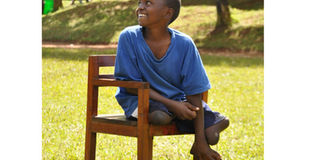Screening to help pupils with impairments

Children will be screened for disabilities while those with disabilities will be supported to access enhanced healthcare, early learning and education, and protection from abuse and neglect. FILE PHOTO
What you need to know:
- Because some children of school-going age with disabilities are sometimes abandoned, stakeholders in Mubende and Kassanda districts are devising means of screening them in early stages of development as a way of putting to a stop some disabilities.
Several physically-impaired children of school-going age are kept in homes and thereby denyied them the right to an education.
“At times these children are kept indoors, where they go for several days without meals while others are only given leftover food. A parent, when asked will clearly state: I have three children and one lame one,” said Sedrack Igangur Kantu, the focal person for Interventions for Disabilities in Early Childhood (IDEC) in Mubende and Kassanda districts.
His comment comes on the heels of a campaign to screen, identify and correct early disabilities and developmental difficulties among children aged three years and below in Mubende and Kassanda districts.
The IDEC campaign, which is spearheaded by the Ministry of Health with support from UNICEF, will see at least 10,000 children screened for disabilities and 720 children and families with disabilities supported to access enhanced healthcare, early learning and education, and protection from abuse and neglect.
According to Kantu, the campaign will focus on “prevention, treatment and rehabilitation of children with the disabilities”.
Sensitising parents
Parents will be sensitised about how to reduce the risks of disability during pregnancy. While children below three years will be screened and those found with symptoms will be assessed further and supported to access health, education and protection services.
The campaign has drawn in support of non-governmental organisations (NGOs) from the two districts.
“We are targeting children that have disabilities aged from 0-8 years because if they are identified early enough, the disability can be prevented or even corrected,” says Mary Achillies Namatovu, the administrative secretary for Children and Wives of Disabled Soldiers Association, in Mubende.
“In addition to screening, the campaign will also try to reduce the negative attitude and practices that cause them to miss out on accessing services such as health and education,” Namatovu explained.
Involving the community
To start on this, community dialogues were held throughout both districts in September to rally parents to support the campaign.
“Limited access to information is one of the greatest challenges among parents that have children with disability. Some parents confessed that they would have loved their children to get treatment but they have no information about the various disabilities and where to access the specialised services for their children,” explained Obedi Byarugaba, the coordinator Village Health Teams, in Kigando Sub-county.
While this particular campaign is targeting children aged 0-8, some district officials are appealing for support to children above this age bracket already living with disabilities.
“Prevention in most cases is better than cure but now we are challenged by the existing number of children who are already living with disabilities. The age bracket identified (0-8) is too low compared to what is on ground. I, therefore, appeal to UNICEF to at least increase the age bracket to cater for a bigger group of children,” Mariam Naggawa, the probation officer Mubende District, stressed.



